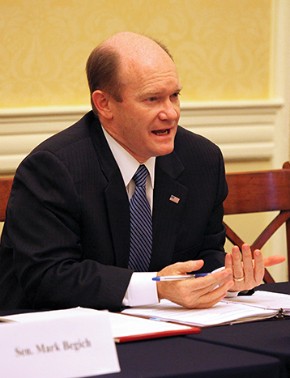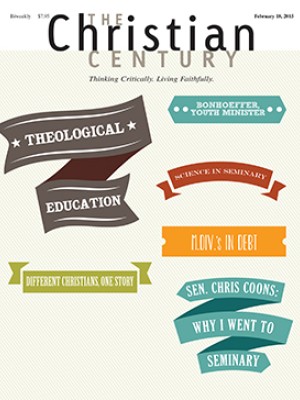Why I went to seminary: A senators theological education

Long before I ever sat in Senate hearing rooms listening to the testimony of witnesses, I sat in lecture halls at Yale Divinity School listening to professors dissect the Pauline letters. My path from law student to divinity student to U.S. senator may not have been the most conventional, but divinity school changed me, and it changed how I see what I do in the U.S. Senate.
I have felt a calling to ministry my entire life. As a youth I was active in my church and youth group and as a volunteer. My parents also put their faith into action. I grew up watching my dad teach Sunday school and volunteer with a prison ministry group—even hosting a convicted felon on furlough weekends at our home, much to our neighbors’ dismay. My mom committed her time to work at a church program serving homeless and battered women.
Read our latest issue or browse back issues.
Following college, I spent a year in Washington writing and researching issues related to apartheid and South Africa. Tired of the abstract nature of think-tank work, I felt an urge to put my faith into action. I traveled to Kenya and South Africa with Plowshares Institute, a faith-based global engagement group, and stayed on for four months afterward. I volunteered with the South African Council of Churches and got to work with many inspiring leaders, including Archbishop Desmond Tutu. I also served with a powerfully faithful woman in Kenya, Zipporah Kamau, who was launching an orphanage outside Nairobi.
When I returned to the United States, I joined the Coalition for the Homeless in New York, which was led by a crusading lawyer, Bob Hayes, and traveled across the country working in homeless shelters and with homeless advocates.
In all these experiences, I was exposed to impressive leaders and advocates who used their skills and training, whether as pastors or attorneys, to make a difference in the world and to serve with those who were oppressed or marginalized. I could tell there were limits to how much of a difference I could make without some formal training. The advocates I most admired were well educated and deeply grounded in their professions.
I had always wrestled with competing interests in law and religion. In 1988, law won out, and I enrolled at Yale Law School. While volunteering in the law clinic during fall semester of my first year, I became friendly with another law student who was also taking classes at the divinity school. He told me about one particular class with Sister Margaret Farley that he said would change my life: “This class is amazing. You have to come once and give it a try.”
The next semester I audited her class on Augustine, Aquinas, Luther, and Calvin. Sister Farley was absolutely riveting. I had no formal training in the theological roots of the Reformation or the Christian faith, but ancient texts became deeply engaging for me because of her talented teaching.
After Sister Farley’s class, I was hooked. I took another class the next semester, and another the following semester. Finally, the dean of admissions at the divinity school, who was a member of my congregation in New Haven, came up to me at church one Sunday and said, “You know, we do let lawyers go to the div school.” I looked at him and said, “What are you talking about?” He told me I could actually be admitted and take a degree at the divinity school; I’d just have to fill out some paperwork. After years of struggling between what felt like entirely different paths, I realized I didn’t have to choose.
My decision to pursue a divinity degree surprised and even alienated a lot of my friends in the law school. My group of friends was very progressive, very accepting of everyone—everyone except, I learned, people of faith. A number of them stopped talking to me, and some acted like I had lost my mind. They were dismissive of divinity as a serious field of study. It was one of the first times I experienced some genuine intolerance as a person of faith, particularly from friends in the progressive community. It was a difficult and eye-opening experience.
Despite some resistance, I never doubted my choice. The next two years of my life were incredibly formative. After starting divinity school, I helped form a prayer group with a number of other law students who were also committed Christians, and it became a dominant feature in my social life. Although I had better formal instruction in the discipline, details, and doctrine of faith at the divinity school, I actually experienced my spiritual formation through interactions with my law school peers. They came from a broad range of cultural and political backgrounds—some were very conservative and some were progressive—but they were all struggling with the culture of law school and the same kinds of questions about our purpose. Why be a lawyer? Why be involved in service? Our discussions challenged my thinking and strengthened my faith.
If there’s one thing, more than any other, that came out of my formal training in scriptural analysis, it was a focus on humility—an insistence on humility—in asserting you know the will of God and understand the word of God.
One of the best things about Yale Divinity School is that there were people in my classes from a wide range of faith traditions. Eight of us might look at the same passage and interpret it eight different ways. Divinity school gave us the chance to debate our competing viewpoints and challenge each other’s assertions. Hearing about how differently various Christian traditions had read and applied the same texts over time taught me an important lesson in humility.
Some of my most meaningful learning in divinity school happened through service outside of the classroom. New Haven, like many American cities, is a study in contrasts. Outside the sprawling courtyards and Gothic facades of the Yale campus is a community that has long been plagued by violence and poverty. I could have confined my experiences to the insulated campus community at Yale, but my upbringing and values demanded otherwise. Even before attending the divinity school, I was actively involved in the housing and homelessness clinic at the law school, helping a group of students successfully sue the governor of Connecticut on behalf of 1,200 homeless families.
Divinity school gave me the opportunity to connect my interest in service to the traditions and obligations of my faith. One of my most memorable experiences was organizing an enactment of the Stations of the Cross in the New Haven community just after the start of the first Gulf War. I was serving at the time as a pastoral intern with the Downtown Cooperative Ministry, an interfaith alliance of a dozen churches, synagogues, and social service ministries. The war had begun abroad, and at home, New Haven ranked among the poorest cities in the nation. With so much suffering around us, this was a chance to take an ancient Catholic devotional tradition and make it real and meaningful to the community.
We gathered a group of 50 people and performed the stations at churches and at shelters and soup kitchens across the city that served the homeless. It was a powerful, public demonstration—a large-scale witness for justice and peace that was rooted in the suffering of Christ.
I think there’s a broad misconception out there—and I came to divinity school believing it—that only those with unshakably firm conviction and profound faith belong in ministry. My divinity school training taught me that, in fact, the opposite is true. In order to be an effective preacher and faith leader, you’ve got to question. I came out of school more convinced than ever that doubt is essential to faith—that without doubt it’s not faith; it’s a dogmatic belief that can become extremism. The whole essence—the definition—of faith rests on a foundation of doubt, and if it rests on a foundation of doubt and questioning, then that demands of us humility as we interpret the text and serve in the world.
Divinity school taught me that, at its core, a life of faith is a life grounded in service and humility. I’ve taken those values with me as my career has progressed from county government to the U.S. Senate. I hope they are evident in every decision I make as a member of Congress.





